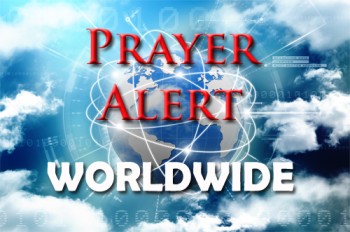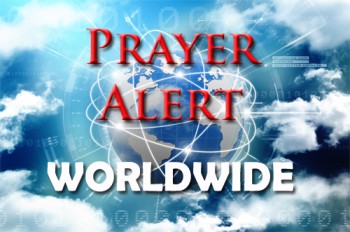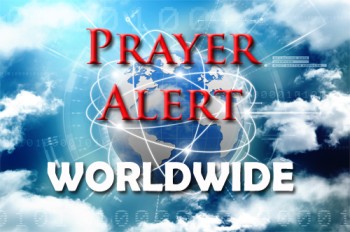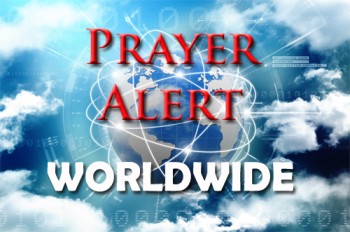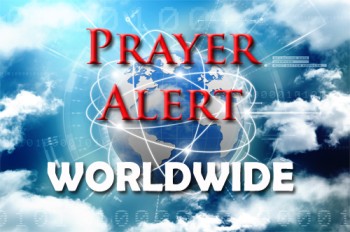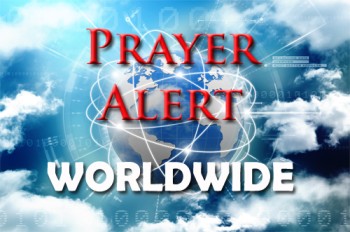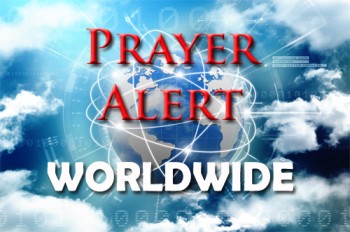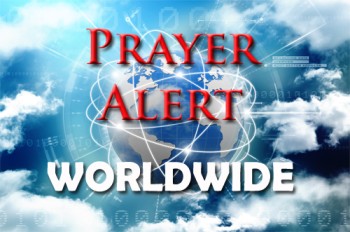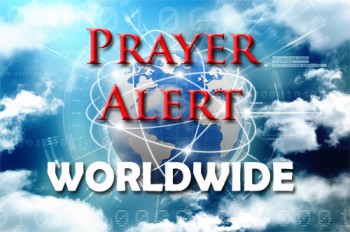Displaying items by tag: Asia
Imprisoned Chinese pastor's daughter: ‘repression cannot extinguish faith'
At a recent meeting in Washington, Grace Jin Drexel shared the moving story of her father, Pastor Ezra Jin, imprisoned in China for his Christian faith. He was arrested in October alongside 27 other leaders from Zion Church, in what has been described as one of the largest crackdowns on independent churches since the Cultural Revolution. Grace explained that the arrests are part of China’s aggressive campaign to bring all religious life under Communist Party control. Churches have been forced to remove crosses, replace worship songs with revolutionary anthems, rewrite sermons to align with socialist ideology, and install surveillance cameras inside sanctuaries. Zion Church was targeted after refusing to install facial recognition cameras. Despite closures and intimidation, the church adapted, developing hybrid online and offline gatherings. During the pandemic, this model led to remarkable growth, expanding to over a hundred meeting spaces in forty cities and reaching thousands daily. Grace also spoke of the severe prison conditions facing detained leaders, her family’s separation, and harassment abroad. Yet she testified confidently that God remains faithful, prayers are not in vain, and repression cannot extinguish the Church.
Gaza: humiliation and trauma after Rafah crossing reopens
When the Rafah border crossing was reopened on 2 February, Palestinian women returning to Gaza have described a journey marked by fear, humiliation and deep emotional trauma. Of around fifty people expecting to cross from Egypt on one day, only twelve - three women and nine children - were ultimately allowed through. Several women reported being separated from their children, blindfolded, handcuffed and interrogated for hours by Israeli forces who control entry at the crossing. One woman said she was threatened with detention and pressured psychologically, despite explaining she only wished to return home and see her children. Basic belongings, food and water were confiscated, adding to the exhaustion of an already gruelling journey. Meanwhile, critically ill patients seeking medical treatment abroad were largely denied passage, leaving tens of thousands waiting inside Gaza. There are also reports that Israel is pressurising NGOs working in Gaza: see
Pakistan: more than 175 terrorists killed in Balochistan
A wave of coordinated terrorist attacks struck multiple towns and cities across Balochistan in the early hours of 31 January, targeting security forces and government installations. The assaults, which were carried out by a group which the state has named Fitna-al-Hindustan (to highlight alleged links with India), prompted large-scale security operations across the province. More than 175 militants have been killed, while fifteen security personnel and eighteen civilians lost their lives. Suicide bombers, including women, were among those involved in the attacks. In response to security concerns, mobile internet services were suspended in Quetta and several other districts, disrupting daily life for residents. Balochistan’s chief minister Sarfraz Bugti pledged firm action to restore stability, while federal officials said operations were continuing to eliminate remaining threats. The violence has heightened fear and uncertainty for communities already living with long-standing insecurity.
USA: Trump will cut tariffs if India stops buying Russian oil
Claims of a major shift in global energy politics emerged after Donald Trump announced plans to cut tariffs on Indian exports. Trump said he had agreed a trade deal with Narendra Modi in which India would stop buying Russian oil, a move he argued could help bring an end to the war in Ukraine. India has been one of Russia’s largest customers since 2022, benefiting from discounted prices as Western nations reduced purchases. While Modi welcomed the tariff reductions and spoke positively about peace, he did not publicly confirm any pledge to halt Russian oil imports. India remains heavily dependent on overseas energy and has emphasised diversification rather than abrupt change. It has already started to cut back on buying Russian oil, even though Moscow insists supplies remain uninterrupted. For an insight on India’s shifting relationship with Russia, see
Iran / USA: possible scenarios if Trump decides to attack
As Donald Trump warns Iran that ‘time is running out’ for a nuclear deal (see ), and with US forces reportedly preparing for strikes on Iran within days, the consequences are far from clear. Limited ‘surgical’ attacks could hit Revolutionary Guard facilities, missile sites and nuclear infrastructure, but hopes for a rapid transition to democracy look highly optimistic, given past interventions elsewhere. Another scenario is the regime surviving but moderating its behaviour, though Iran’s leaders have historically resisted change. Many observers fear a collapse followed by hard-line military rule, or worse, nationwide chaos and conflict involving ethnic minorities. Iran has vowed retaliation, which could take the form of missile and drone attacks on US bases or warships, or mining the Strait of Hormuz, which is a vital shipping ‘chokepoint’, especially for global oil and LNG. Iran’s Arab neighbours, all US allies, are understandably jittery that Iran could attack them. The most dangerous scenario is escalation into a wider war with no clear end-state and severe regional and economic fallout.
China: speculation about reasons for dismissal of two senior generals
The recent decision to remove China’s two most senior generals, Zhang Youxia and Liu Zhenli, and place them under investigation has prompted intense speculation. Zhang was the highest-ranking military figure in the Communist Party, while Liu oversaw key operational command structures. Although the suddenness of their dismissal surprised observers, China’s opaque political system makes firm conclusions difficult. Official statements cite serious disciplinary and legal violations, consistent with Xi Jinping’s long-running anti-corruption campaign within the military. Corruption in procurement and appointments has led to the investigation or dismissal of dozens of senior officers in recent years. While some analysts suggest internal disagreement or damage to military confidence, there is little evidence the moves threaten Xi’s authority. Nor is it clear they weaken or strengthen China’s military capabilities, including regarding Taiwan. Instead, the dismissals probably reflect an intensified drive to enforce discipline and reshape military culture ahead of long-term national planning.
Israel: football pitch for Palestinian children wins a reprieve
A small Palestinian children’s football pitch in Bethlehem has been granted a temporary reprieve after Israel postponed its planned demolition. The Aida Youth Centre pitch, built in 2020 to serve more than two hundred children from the nearby Aida refugee camp, was declared illegal for lacking permits and for its proximity to Israel’s security barrier. A demolition order issued late last year sparked a widespread international campaign, including a petition signed by more than half a million people and appeals from figures within global football. The Israeli military, which still maintains that the pitch poses security concerns, says the postponement is ‘for the time being’. For local families, the issue carries deep emotional weight, symbolising dignity, hope, and normal childhood amid overcrowding and restriction. While the immediate threat has eased, the community fears the order could return once attention fades, and has vowed to keep campaigning.
Pakistan: devastating fire in Karachi shopping centre
Grief and anger grip Karachi after a devastating fire tore through Gul Plaza, a crowded wholesale shopping centre, leaving at least 27 people dead and more than seventy missing. The blaze spread rapidly late on 17 January, trapping shoppers and workers inside a building packed with stalls and mostly locked exits. Survivors described panic, thick smoke, and desperate attempts to escape as flames engulfed the floors within minutes. Many families are still waiting for news of loved ones, gathering at the ruins in anguish and uncertainty. Rescue efforts have been slowed by the unstable, heavily damaged structure, with officials warning it could collapse at any time. As forensic teams work to identify victims, public frustration has grown over alleged delays in emergency response and long-standing safety failures. Protests have erupted, with calls for accountability, reforms in building regulations, and improved disaster preparedness to prevent further tragedies.
Syria: US moves 150 IS prisoners, thousands to follow
US forces have begun transferring IS prisoners out of Syria, moving 150 detainees to Iraq under plans that could see up to 7,000 relocated. The move follows growing instability after Kurdish-led Syrian Democratic Forces (SDF) withdrew troops from parts of northeast Syria, raising concerns over the security of prisons and detention camps holding thousands of IS members and affiliates. US officials said recent unrest allowed around 200 low-level fighters to escape one facility, though many were later recaptured. More than 10,000 IS fighters remain imprisoned in Syria, alongside thousands of women and children connected to the group. The transfers are being carried out in coordination with the Iraqi government as part of efforts to prevent a resurgence of IS and maintain regional security. The changes come amid a wider political shift, with Syria’s new government seeking to reassert control after the fall of Bashar al-Assad. A ceasefire has been agreed with the SDF, which has been urged to integrate into the Syrian state, marking a significant transition in security arrangements.
Pakistan: exports of rice rise significantly
Exports of rice from Pakistan rebounded strongly in December 2025, rising 14% month on month, driven largely by a surge of more than 50% in basmati shipments. Total exports reached 489,000 tonnes, allowing Pakistan to overtake Vietnam and become the world’s third-largest rice exporter for the month, behind India and Thailand. The UAE and China were the top destinations, while exports also expanded across Africa, Europe, and North America. A significant development was Pakistan’s growing presence in Central Asia, as exporters shifted to direct trade routes following Afghan border closures. Despite these gains, deep structural challenges remain, including intense global competition, policy inconsistencies, high logistics costs, and limited access to key markets such as Iraq and Turkiye. Encouraging signs include rising demand from Iran, Central Asia, and the USA, offering hope for sustained recovery if reforms follow.

